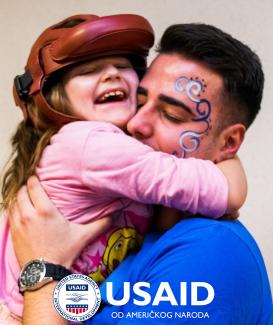Through the INSPIRE Human Rights program, USAID works to empower BiH citizens and government institutions to improve overall human rights protections, services, and employment prospects for Bosnia and Herzegovina’s most vulnerable citizens.
USAID ASSISTANCE
Launched in September 2020, USAID’s INSPIRE Human Rights project responds to the ongoing socio-political and economic challenges faced by marginalized groups of society in BiH. It supports civil society organizations (CSOs) and individuals that advocate for the rights, empowerment, and dignity of underrepresented populations, while engaging citizens in these civic/political issues themselves. A main goal of the project is that all levels of BiH government recognize and include CSOs and citizens as necessary, respectable partners in policy development. Technical assistance is also used to build the capacity of these CSOs and BiH institutions to better serve marginalized citizens.
IMPLEMENTATION AND RESULTS
This program’s main components for protecting and promoting the human rights, social development, and inclusion of underrepresented groups are:
- Grants to local organizations that combat human trafficking by strengthening anti-human trafficking measures and ensuring implementation.
- Grants to local organizations that promote the rights and dignity of those with disabilities and members of the LGBTQI+ and Roma communities.
- Targeted training to increase the capacity of supported NGOs, associations and CSOs in financial sustainability, advocacy, and outreach.
- Assistance for up to 20 municipal governments to create a sustainable scheme that fosters formal employment opportunities for vulnerable women and members of other disadvantaged groups.
- Technical assistance to build the capacity of USAID partners, institutions, and government leaders to better protect the rights of these underrepresented citizens in a sustainable and manageable fashion.
EXPECTED RESULTS
By the end of the project’s life, USAID expects to achieve the following:
- Increased support from the private sector and local government for the seven Service Centers for Families of Children with Disabilities so they are sustainable at the local level.
- A community-based model of deinstitutionalization will be refined and expanded across BiH.
- More public-private partnerships to provide formal employment opportunities to women and minority groups, such as Roma.
- Stronger local organizations that advocate on issues related to the LGBTQI+ and other underrepresented groups, including victims of human trafficking.
ACHIEVED RESULTS
By 2023, USAID had achieved the following:
- Awarded 15 grants to 11 local organizations to combat human trafficking by strengthening anti-human trafficking measures and ensuring implementation.
Developed the first comprehensive analysis of the processing of human trafficking in BiH. Ensured adoption of guidelines for courts to punish persons involved in human trafficking. Provided legal and psycho-social support to human trafficking victims during a major criminal case in which the first-instance verdict sentenced organized human traffickers to a total of 74 years in prison.
- Supported seven Service Centers that provided more than 146,000 various services for children with disabilities and their family members.
- Contributed to adoption of the Law on Parents-Caregivers in the Federation of BiH establishing that the parent of a person with 100 percent disability caused by an illness or developmental disorder has the right to a minimum monthly allowance.
- Created Public-Private Partnerships in 10 local communities across BiH, which helped to establish and/or develop 65 women-run businesses.
- Awarded nine grants to six local organizations to promote the rights and dignity of members of the LGBTQI+ community.
- Trained more than 150 human rights organizations through 28 targeted trainings in financial sustainability, advocacy, and outreach and communications.
- Strengthened local organizations that advocate on human rights and other issues related to the LGBTQI+ community.

